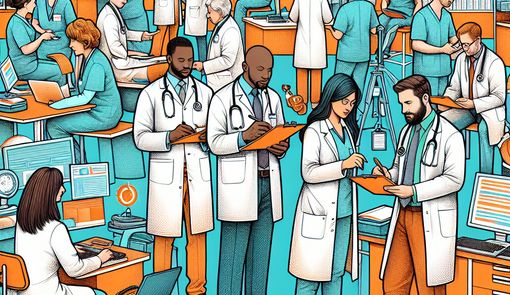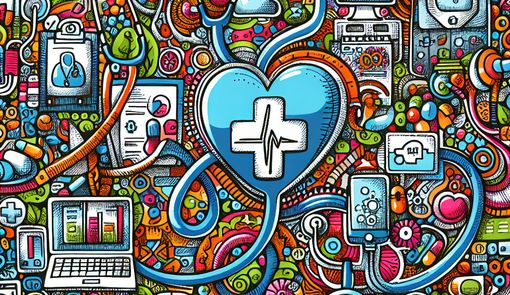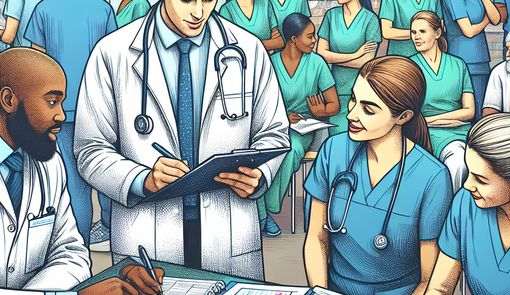Advancing Your Career as a Clinical Documentation Improvement Specialist

As clinical documentation improvement (CDI) specialists, professionals are tasked with a critical role in the healthcare industry: ensuring the accuracy, specificity, and completeness of patient medical records. These records don't only impact patient care but also affect the financial health of medical institutions and compliance with governmental regulations. Given the importance of this role, there's significant potential for career advancement for those who excel in it. This article will explore strategies and tips for CDI specialists seeking to climb the professional ladder and take on leadership roles.
Education and Certification
Education lays the foundation for any career advancement plan, and this is particularly true for CDI specialists. A bachelor's degree in a relevant field such as healthcare administration, nursing, or health information management is typically the baseline educational requirement. However, to distinguish oneself and prepare for more advanced positions, pursuing additional credentials can be highly beneficial. Attaining certifications such as the Certified Clinical Documentation Specialist (CCDS) or the Certified Documentation Improvement Practitioner (CDIP) demonstrates a commitment to the field and mastery of the specialized knowledge required to excel.
In addition to credentialing, consider pursuing a master's degree or targeted coursework in healthcare management, business administration, or health informatics. These studies can provide deeper insights into the healthcare system's management and operations, setting the groundwork for leadership roles.
Professional Development
Continuous learning is vital in the ever-evolving field of healthcare. CDI specialists should stay abreast of the latest best practices, technology, and regulatory changes. This might involve attending conferences, participating in webinars, or taking part in professional development courses. Engaging in professional organizations such as the Association of Clinical Documentation Improvement Specialists (ACDIS) or the American Health Information Management Association (AHIMA) can provide networking opportunities and access to a wealth of resources for professional growth.
Expertise in Health Information Technology
In modern healthcare, proficiency with electronic health record (EHR) systems and other health IT tools is essential. Advanced CDI roles often require the ability to not only interpret complex medical information but also to navigate and optimize EHRs. Gaining expertise in health informatics and data analytics can make CDI specialists invaluable assets, capable of taking on roles that involve overseeing documentation strategies across entire healthcare systems.
Communication and Leadership Skills
Effective communication is at the heart of CDI, requiring the ability to convey complex medical information clearly and collaborate with physicians, nurses, and coding staff. To step into leadership, CDI specialists should hone these soft skills, which can include conflict resolution, negotiation, and the ability to lead and motivate a team. Leadership or management training programs can be an excellent way to build these competencies.
Specialized Knowledge in Clinical Areas
While generalists can succeed in the CDI field, developing specialized knowledge in a particular clinical area can set a specialist apart and pave the way for advanced roles. Whether it's cardiology, oncology, or any other specialty, depth of knowledge can lead to a role as a subject matter expert, consulting on complex cases or helping to develop CDI strategies tailored to specific departments.
Quality Improvement Initiatives
Quality improvement (QI) in healthcare focuses on enhancing patient outcomes and operational efficiency. A CDI specialist with a knack for QI can lead initiatives to refine documentation processes, reducing errors, and improving the fiscal performance of the healthcare facility. This kind of impact is often recognized with promotions and opportunities to lead larger projects or teams.
Mentoring and Education
Sharing knowledge and developing the skills of others can be a powerful career advancement tool. By becoming a mentor to less experienced CDI professionals or providing education and training, specialists establish themselves as leaders in the field. Moreover, teaching can highlight one's mastery of the subject, opening doors to consultant or managerial positions.
Professional Networking
Building a strong professional network can be an invaluable asset. Knowing other professionals in the industry can lead to opportunities for collaboration, career advice, and job openings that might not be publicly advertised. Keep in touch with peers, join professional groups on platforms like LinkedIn, and consider participating in mentorship programs, both as a mentor and a mentee.
Conclusion
Advancing your career as a CDI specialist involves a multifaceted approach that combines education, certification, and professional development with specialized knowledge, technological proficiency, and the development of soft skills. By pursuing these avenues, CDI specialists can position themselves for leadership roles and a fulfilling career trajectory. As healthcare continues to evolve, the professionals who demonstrate adaptability, strategic thinking, and a commitment to excellence will be well-placed to ascend to new heights within the field.
Frequently Asked Questions
1. What educational background is required to become a Clinical Documentation Improvement (CDI) specialist?
A bachelor's degree in a relevant field such as healthcare administration, nursing, or health information management is typically the baseline educational requirement to become a CDI specialist. However, pursuing additional certifications and advanced degrees can enhance career opportunities.
2. How important are certifications for CDI specialists?
Certifications such as the Certified Clinical Documentation Specialist (CCDS) and the Certified Documentation Improvement Practitioner (CDIP) demonstrate expertise and dedication to the field. They can also unlock career advancement opportunities and higher salary potential.
3. How can CDI specialists stay updated with changes in the healthcare industry?
CDI specialists can stay current by attending conferences, participating in webinars, joining professional organizations like the Association of Clinical Documentation Improvement Specialists (ACDIS), and engaging in continuous professional development activities.
4. What role does health information technology play in the work of CDI specialists?
Proficiency in health information technology, including electronic health record (EHR) systems and data analytics, is crucial for CDI specialists. It allows them to effectively manage and optimize patient medical records and contribute to quality improvement initiatives.
5. How can CDI specialists develop leadership skills?
Developing leadership skills involves honing communication, conflict resolution, and team management abilities. CDI specialists can benefit from leadership training programs and mentorship opportunities to prepare for advanced roles.
6. Is specialization necessary for CDI specialists?
While not mandatory, specializing in a clinical area can distinguish a CDI specialist and open up opportunities to work as a subject matter expert in specific medical fields. This specialization can enhance the quality of documentation and improve patient care.
7. How can mentoring and education benefit CDI specialists?
By mentoring junior professionals and sharing knowledge through educational initiatives, CDI specialists can demonstrate leadership skills, establish themselves as experts in the field, and potentially progress into managerial or consulting positions.
8. Why is professional networking important for career advancement?
Building a strong professional network can create opportunities for collaboration, career guidance, and access to hidden job prospects. By connecting with peers and industry professionals, CDI specialists can stay informed about industry trends and potential career openings.
Further Resources
Education and Certification
- Certified Clinical Documentation Specialist (CCDS) - Learn more about this certification and its requirements.
- Certified Documentation Improvement Practitioner (CDIP) - Explore the benefits of earning the CDIP credential.
- Association of Clinical Documentation Improvement Specialists (ACDIS) - Join this organization for networking and resources.
- American Health Information Management Association (AHIMA) - Access valuable industry information and educational opportunities.
Professional Development
- Healthcare Information and Management Systems Society (HIMSS) - Stay updated on healthcare technology trends and innovations.
- American Medical Informatics Association (AMIA) - Explore resources for health informatics professionals.
- Coursera - Enroll in online courses related to healthcare management and leadership.
Health Information Technology
- American Health IT Solutions - Stay informed about the latest in health IT solutions and services.
- Healthcare Information and Management Systems Society (HIMSS) - Discover resources for advancing your health IT skills.
Communication and Leadership Skills
- Dale Carnegie Training - Improve your communication and leadership abilities with training programs.
- Harvard Business Review - Access articles and insights on effective leadership and management practices.
Quality Improvement Initiatives
- Institute for Healthcare Improvement (IHI) - Learn about quality improvement methodologies and initiatives.
- Agency for Healthcare Research and Quality (AHRQ) - Access tools and resources for improving healthcare quality.
Mentoring and Education
- Mentoring.org - Get involved in mentoring programs to support professional growth.
- edX - Explore online courses from top universities to expand your knowledge.






